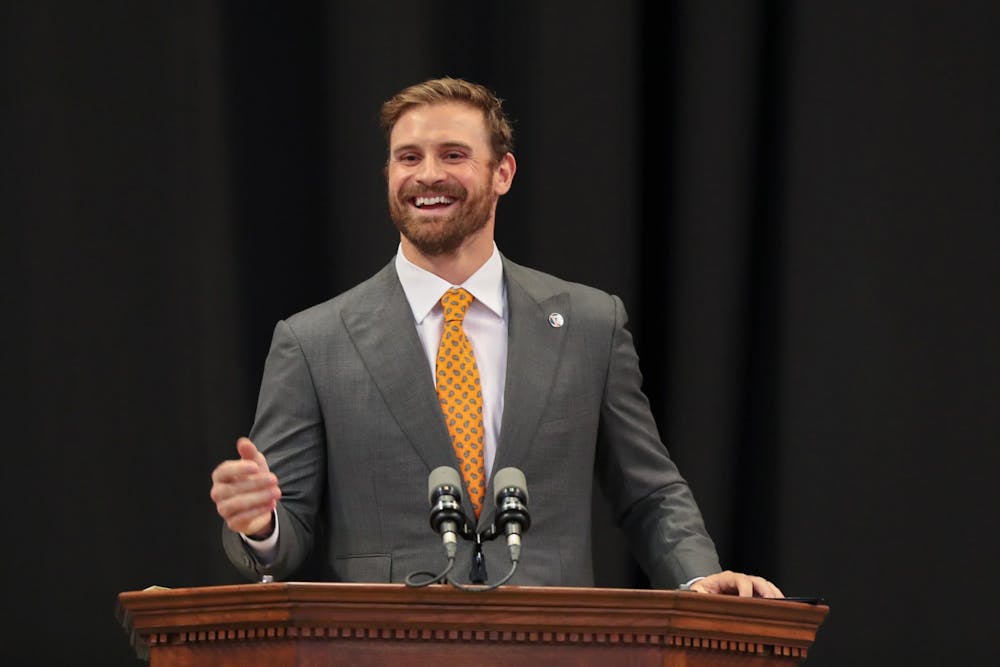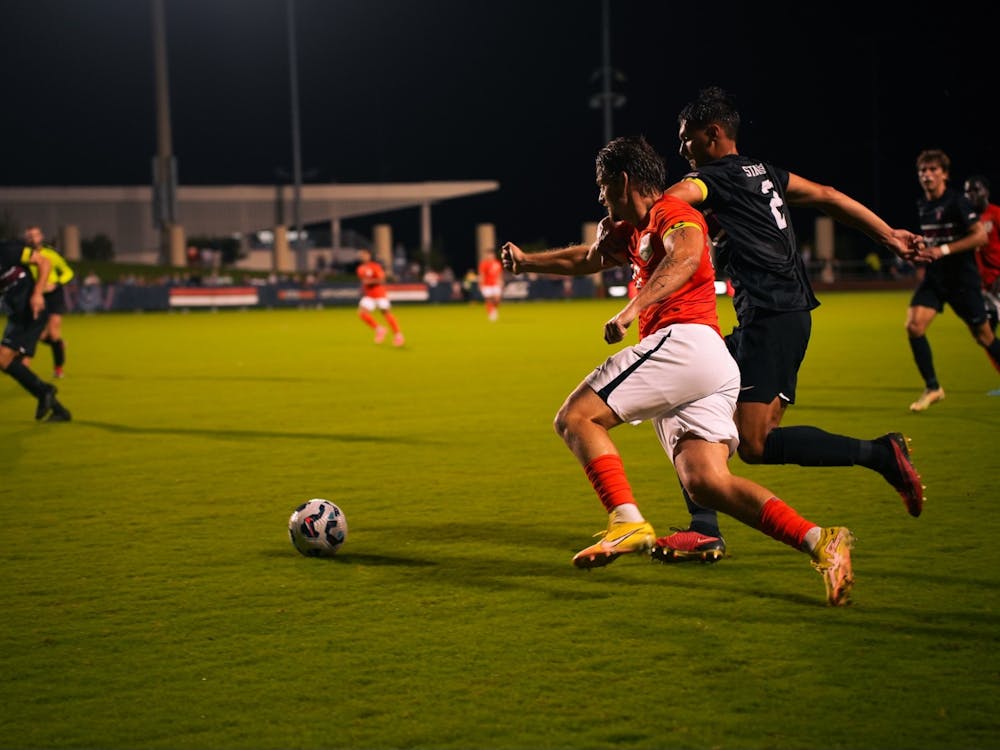From the Black Lives Matter movement to kneeling during the national anthem to protests over the gender wage gap, it’d be easy to label this era as a time when sports and politics are more interwoven than ever. This theory is supported by players, teams and now even the president rejecting ceremonial White House trips, controversy regarding players and owners commenting on foreign affairs, and teams choosing to stage walkouts during important games. However, it is an idea that Bonnie Hagerman, assistant professor of women, gender and sexuality, rejects.
“This is not a moment in time without a historical context,” Hagerman said. “There is a historical context for athletes using their platform in various different ways to promote social justice.”
Rather than identifying the state of sports today as an individual moment of protest and dissatisfaction, she instead views it as the continuation of a long standing tradition of sports acting as a mirror of the issues that a society faces at a given point in time. She cites Jackie Robinson, Muhammad Ali, Tommie Smith and John Carlos as precursors to the outspoken athletes we are familiar with today like Colin Kaepernick and Lebron James. Though an athlete’s engagement in fields beyond athletics can often be controversial, Hagerman believes the line between sports and political issues to be not just blurred, but nonexistent.
“A lot of people would like to keep sport and politics separate,” Hagerman said. “There’s just no way you can do that. Sport is a reflection of society. There’s no getting around the fact … you can’t separate the two. It’s going to reflect the inequities [and] the inequalities [and] not just in terms of race, but in terms of gender and sexuality, issues of ability and economy.”
Hagerman views the ability of players with large platforms to speak out as a “privilege” and spoke of the Virginia men’s basketball team kneeling in 2016 as just another in the long list of examples of athletes using their platforms to promote ideals they believe in. She made special note of the coaches’ and administration's support of the demonstration.
“The tact we need to take at U.Va. is to support those student-athletes that are interested in using their platform to draw attention to important issues,” Hagerman said.
Perhaps because of the support they received at the University, or simply because their convictions are strong, Virginia Athletics alumni have made their voices heard on an assortment of pressing topics.
Malcolm Brogdon
While the former Cavalier guard and 2017 NBA Rookie of the Year award winner has made a name for himself as one of Virginia’s best basketball players, Malcolm Brogdon has also been busy off the court. The Atlanta native has focused on tackling a variety of issues, including water insecurity in East Africa and the struggles Black Americans face today. In 2018, Brogdon founded Hoops2o and is an active supporter of Hoops4Humanity, organizations which work to build water wells in Tanzania.
Brogdon also took an important stand regarding protests taking place in the United States following the death of George Floyd, speaking at several demonstrations that followed.
“This is a moment,” Brogdon said at a rally in Atlanta. “We have leverage right now … We gotta keep pushing forward.”
Following the NBA restart in the bubble, Brogdon chose the phrase “I can’t breathe” to embellish the back of his jersey in order to bring more attention to the issue of police brutality. In an interview with The Undefeated, Brogdon’s views on his role as an athlete and activist were neatly summarized.
“Basketball is my job — I love it,” he said. “It’s the dream. But honestly, my life passion is not basketball. It’s helping people and using my resources that I have gotten from basketball [to do so].”
Dawn Staley
Along with being a Women’s Basketball Hall of Fame player and coach, an Olympic gold medalist and a distinguished Virginia women’s basketball guard, Dawn Staley has committed herself to promoting diversity and equity. Over the summer, she spoke at a protest against racial injustice and police brutality in South Carolina.
“My heart told me to speak out,” Staley said. “My heart feels for George Floyd and his family and all the deaths that happened in our country. It leaves us answerless. I just felt like I’ve got to get up and do something.”
Staley’s activism on social media and across the internet has also increased since the incident. She is vocal on Twitter and recently wrote an essay for The Player’s Tribune titled “Black People Are Tired”. In the essay, she expresses the frustration and exhaustion people of color experience having to watch what seems like endless instances of injustice without reform.
“People are mad because NOTHING HAS CHANGED,” Staley wrote. “If you don’t like something, if you don’t like the laws that we have to live by, you gotta get out and VOTE.”
She is now a member of the SEC Council on Racial Equity and Social Justice where she aims to promote strategies such as increasing access and representation for underrepresented minorities in the SEC.
Becky Sauerbrunn
Instrumental to the recent string of success that the U.S. Women’s National Team has experienced, former Virginia center back Sauerbrunn has been equally instrumental in the fight for equal pay and unionization that women’s soccer players have brought to light. She has also stood in solidarity with the Muslim community and supported her teammate Megan Rapinoe as the US Women’s National Team criticized President Trump. Sauerbrunn told The Guardian in 2019 she would not attend a White House visit after the USMNT won the World Cup.
In 2017, Sauerbrunn and her teammates negotiated a collective bargaining agreement that improved pay for its players, in some cases by as much as 30 percent. While it did not guarantee equal pay with the men’s team, it was a huge step towards more fair and equitable payment for female athletes competing in the United States. That same year, she lobbied the state of Oregon to pass an equal pay bill, making her position clear to the legislature as pay equity was debated.
“The issue is not just about money either — it is about our basic treatment as players compared to our male counterparts,” Sauerbrunn said. “From the type of field we lay on to the way we travel, there are big differences between genders in spite of our shared employer and shared profession.”
Sean Doolittle
Former Cavalier and current Nationals reliever Sean Doolittle is noted for his outspoken nature as well as his career accomplishments which include a 2019 World Series ring. A vocal supporter of veterans, Doolittle participates in the Nationals’ Salute to Service project, engaging with surviving family members of American troops before games at Nationals Park. He is also a supporter of Operation Finally Home, which builds and furnishes housing for wounded soldiers once they return home from duty. He has taken to Twitter on a number of occasions to make his stances clear on a variety of issues, including LGBTQ+ inclusivity, Syrian refugee aid and the rejection of the white supremacist views on display at the “Unite The Right” rally in Charlottesville on Aug. 11 and 12, 2017.
“People say, ‘If we don't give them attention, they'll go away,’” Doolittle tweeted in August of 2017 in a thread regarding the rally. “Maybe. But if we don't condemn this evil, it might continue to spread.”
More recently, Doolittle has been open in his criticism of President Donald Trump, even rejecting the White House invitation that followed his 2019 World Series championship, citing his mockery of the disabled and his own support of LGBTQ+ rights.
“I used to care a lot about what other people thought, like teammates,” Doolittle said in a 2018 interview with The Washington Post. “But then, I feel like in this atmosphere, and in general, if people can tell that you’re being genuine — if this is something you really care about, if this is something you know a lot about — people will respect that.”
Chris Long
It would be negligent to discuss Virginia Athletics alumni and activism without mentioning Long. The former Rams, Patriots and Eagles defensive end, two-time Super Bowl champion and 2019 NFL Man of the Year supports a host of causes and the Chris Long Foundation has no shortage of initiatives. One such initiative is the Grub4Good fund that benefits the Charlottesville community by providing free meals as well supporting and supplementing lost revenue to local restaurants during the COVID-19 pandemic. Long is also the architect behind the Waterboys initiative, the foundation which inspired Brogdon’s work, as both organizations strive to raise funds and awareness towards clean water in East Africa. Like Doolittle, Long supports veterans and their families by making donations to Homes For Our Troops and Merging Vets and Players as well as hosting events for those that served our country.
In 2017, Long donated his game checks to educational institutions, promoting learning accessibility and opportunity for children that may not otherwise receive it. This was in part a response to the “Unite the Right” rally and the controversy surrounding it in the Charlottesville area.
“Educational opportunity and equity are the best gateway to a better tomorrow for everyone in America,” Long said on his foundation’s website.
Like Doolittle, Long is active on Twitter and is open in his criticism of Trump. After he won his second Super Bowl, he declined the White House invitation extended to him, citing the President’s comments about the Charlottesville rallies as one of the reasons in which he remarked that there were “very fine people on both sides.” Long was unequivocal in his stance and emphasized this in an interview with CNN, stating that the decision was beyond political preference.
“For me, it’s not just about politics,” Long said. “To me, it’s about doing the right thing. It’s not about choosing sides or anything. It’s simply about right and wrong.”
These athletes, along with many other Virginia Athletics alumni, perpetuate and continue the history of using sports as a platform to lift up viewpoints or causes that are topical and important in society. We have already seen a new generation of student athletes discovering their voices as activists at the University such as football’s Groundskeepers Initiative or the Barnett twins and their Instagram account, @athletes4blm.
“This idea of a long history of activism, of sports men and women using their platforms to talk about social justice issues is really important,” Hagerman said.





